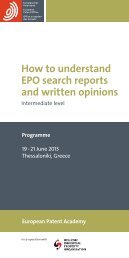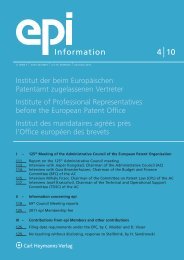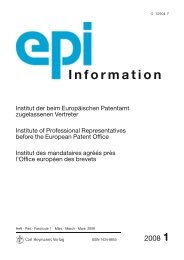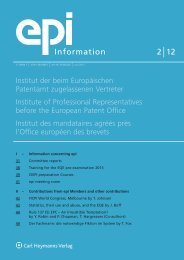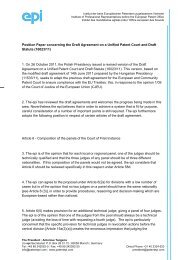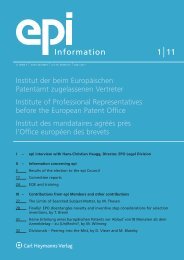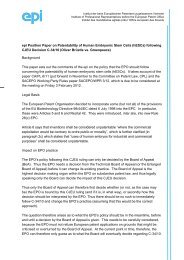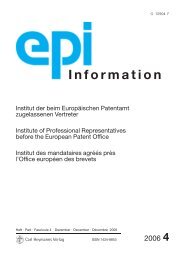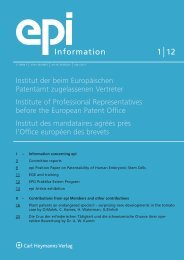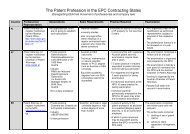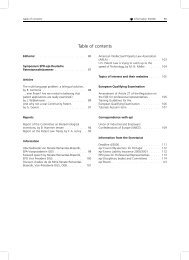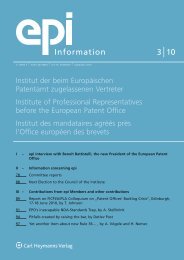epi Information 2/2009
epi Information 2/2009
epi Information 2/2009
Create successful ePaper yourself
Turn your PDF publications into a flip-book with our unique Google optimized e-Paper software.
68 Articles <strong>Information</strong> 2/<strong>2009</strong><br />
motivation, of all applicants would probably be unpopular.<br />
Discussion<br />
What are we facing now in view of T 0307/03? Is there<br />
going to be another chain of deplorable decisions<br />
restricting applicants’ rights as in the run-up to G1/05?<br />
Is there then, as soon as pressure has risen sufficiently,<br />
going to be another decision of the Enlarged Board of<br />
Appeal in order to overturn this chain of decisions as<br />
happened with G1/05? Will it again be found that the<br />
referring decisions lack a legal basis (ultra vires) for<br />
defining any additional requirements to be imposed on<br />
divisional applications? 14 And are we then going to face<br />
another amendment of the Implementing Regulations<br />
concerning divisional applications which is further going<br />
to severely restrict the applicant’s possibilities?<br />
Let’s hope not.<br />
Decision T 0307/03 was taken at a time when the<br />
change in the Implementing Regulations to enter into<br />
force on 1.4.2010 was not yet decided. 15 Indeed the first<br />
office action to the parent application in this specific case<br />
was issued more than 24 months before the divisional<br />
application was filed. Under the new Implementing<br />
Regulations there could not have been a divisional<br />
application in this specific case. The new and coming<br />
Implementing Regulations are a severe restriction to the<br />
possibilities of applicants to get well-deserved protection<br />
for their inventions. The change to the Implementing<br />
Regulations was introduced due to a very few users who<br />
were allegedly abusing the system but the change will be<br />
affecting all users. Further changes with further restrictions<br />
are certainly undesirable.<br />
Hopefully therefore the same route will be taken by<br />
the Boards of Appeal as with T 998/98, where the<br />
decision was criticised and simply not followed by later<br />
decisions. 16 If indeed abuse of the system is made by<br />
filing divisional applications claiming the same subject<br />
matter as a refused or revoked parent, the European<br />
Patent Office nevertheless gets the fees and may simply<br />
refuse the divisional application by referring to the<br />
decision in the parent case.<br />
Conclusion<br />
It remains unclear what precisely may be the fundamental<br />
objection to double patenting. Double patenting is no<br />
ground for refusal of the grant of a European patent, and<br />
T 307/03 should not be followed. If national legislatures<br />
find double patenting of European patents to be objectionable<br />
national legislation against it should use<br />
national criteria, as is permitted by A 139(3)EPC in<br />
conjunction with A 139(2) EPC.<br />
14 See G1/05, reasons 13.5<br />
15 Decision of the administrative Council dated 25.3.<strong>2009</strong> amending, among<br />
others, R 36 of the Implementing Regulations. 16 See T15/05 and T 5/05.



